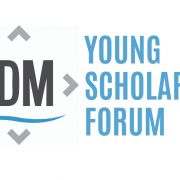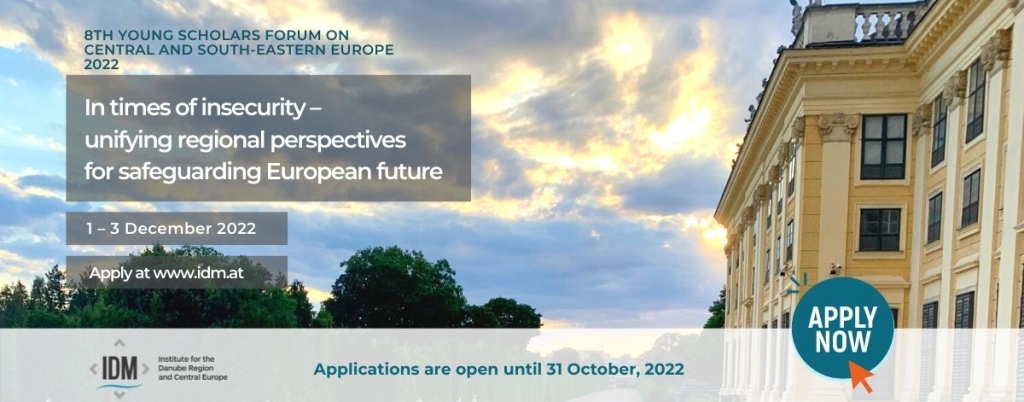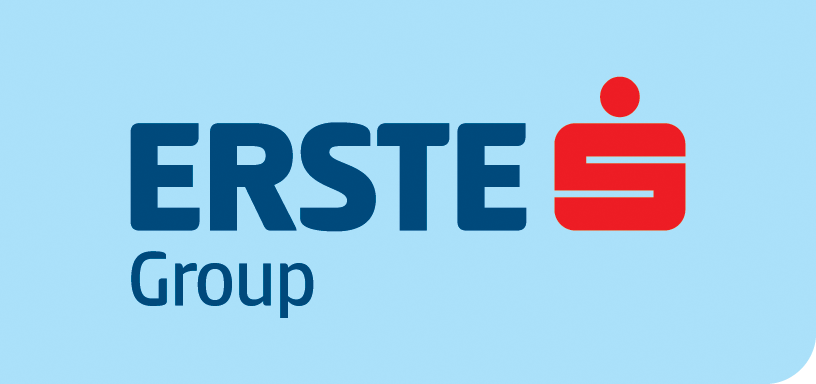Call for participation: 9th Young Scholars Forum on Central and Southeastern Europe 2024 “Regions as Drivers of European Integration”
Organised and hosted by the Institute for the Danube Region and Central Europe (IDM), the Forum invites young, earlystage students and researchers from across Europe to present their research, fostering transnational dialogue and cooperation across borders. Aligned with the IDM’s vision and mission of promoting democracy, freedom, and human rights through regional collaboration, the Forum aims to advance the research on European integration by examining the pivotal role of regions. Participants will engage in expert-led panels, explore themes such as decentralised governance and macro-regional strategies, and partake in a vibrant social programme, while enhancing their academic and professional networks.
The first two days of the Forum will involve four thematic panels moderated by experts, the third day is designated for further exchange among participants during a thematically appropriate social programme in Vienna and Lower Austria.
Aims of the Forum
- Promoting and encouraging young scholars to engage with Central and Southeastern Europe
- Presentation of young scholars’ research to a wider public
- Exchange among young and more advanced researchers on topics, methods, sources and results
- Networking with established experts from the field
- Facilitating mobility within the region
- Providing cultural programme in Vienna and Lower Austria
- Exploring the role and activities of the Government of Lower Austria as one of the federal states of Austria
- Engaging with the project partner ARGE Donauländer (Working Community of the Danube Regions)
- Publication of contributions and results in the IDM scientific journal Der Donauraum
Who we are looking for
We are seeking a maximum of 20 young scholars working on Central and Southeastern Europe in the fields of peace research and security policy, cultural studies, political sciences, economy, geography, sociology, media studies and history to contribute with their research to the analysis of the afore-mentioned issues.
What you need to apply
- a full academic CV
- an abstract (max. 500 words) of the research paper that shall be presented and discussed at the forum
Costs for travel expenses (up to € 200,-) as well as board & accommodation will be covered by the IDM.
Applications for participation should be submitted in English via e-mail by September 30, 2024. Early bird applications are highly welcomed.
Please send your application to:
Institute for the Danube Region and Central Europe (IDM)
Mr Daniel Martínek | d.martinek@idm.at
Language of the Forum: English
Thematic programme of the Forum
Panel I
From local to regional
In the context of European integration, local and regional communities play a vital role in shaping and implementing EU policies using the bottom-up approach. Being the closest to the citizens, local governments address specific needs and challenges and foster grassroots democracy. Regional bodies coordinate these efforts, ensuring coherence with broader EU objectives. This multi-level governance enhances policy effectiveness, promotes economic and social cohesion at the local level, and strengthens European identity by involving citizens directly and locally in the integration process. We will focus on the role of local and regional actors within the European multi-level governance structures.
Chaired by Nadija Afanasieva, Director of Ukrainian Institute for International Politics (UIIP)
Panel II
Decentralised governance and regional autonomy
The panel elaborates on the balance and interaction between regional and national authoritiesin the framework of both the nation-state and European governance. While nation-states currently coordinate EU policies and ensure the unity and coherence of their implementation, regions are in fact the receivers and final beneficiaries who effectively tailor EU policies to local needs. This structure allows regions to innovate and address unique challenges while contributing to broader EU goals, fostering both regional identity and European solidarity. We discuss the potentials and challenges of decentralised governance and of gaining more regional autonomy, considering the distinctive nature of the countries of Central, Eastern and Southeastern Europe.
Chaired by Elisabeth Donat, Assistant Professor at the Department for European Policy and the Study of Democracy of the University for Continuing Education Krems
Panel III
Macro-regional strategies
We will explore the role of EU macro-regional strategies in enhancing integration, cohesion, and enlargement and how these address regional challenges, promote economic development, and foster environmental sustainability. Special emphasis will be placed on the discrepancies and differences between EU member and non-member countries, examining governance, development levels, and access to EU funding. Following the Austrian Presidency of the EUSDR in 2024, we will re-evaluate the role of macro-regional strategies and their contribution to the enhancement of regional cooperation and stability in the Danube Region.
Chaired by Robert Lichtner, Coordinator of the Danube Strategy Point
Panel IV
Bringing borders back
The impact of geographical, territorial and nation-state as well as mental borders on European integration and enlargement will be the focus of this panel. We will address the resurgence of nationalism and protectionism amongst European national governments and its effects on the perception of European multi-level governance. We will take a look at how to balance national sovereignty with the goals of European integration, cohesion and enlargement given the current stagnating and centrifugal forces of European integration.
Chaired by Almina Bešić, Assistant Professor at the Johannes Kepler University Linz
In cooperation with:











